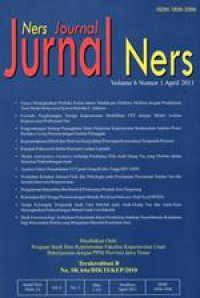
Jurnal
Preventing Medication Error Based on Knowledge Management Against Adverse Event
Introductions: Medication error is one of many types of errors that could decrease the quality and safety of healthcare. Increasing number of adverse events (AE) reflects the number of medication errors. This study aimed to develop a model of medication error prevention based on knowledge management. This model is expected to improve knowledge and skill of nurses to prevent medication error which is characterized by the decrease of adverse events (AE). Methods: This study consisted of two stages. The first stage of research was an explanative survey using cross-sectional approach involving 15 respondents selected by purposive sampling. The second stage was a pre-test experiment involving 29 respondents selected with cluster sampling. Partial Leas square (PLS) was used to examine the factors affecting medication error prevention model while the Wilcoxon Signed Rank Test was used to test the effect of medication error prevention model against adverse events (AE). Results: Individual factors (path coefficient 12:56, t = 4,761) play an important role in nurse behavioral changes about medication error prevention based in knowledge management, organizational factor (path coefficient = 0276, t = 2.504) play an important role in nurse behavioral changes about medication error prevention based on knowledge management. Work characteristic factor (path coefficient = 0309, t = 1.98) play an important role in nurse behavioral changes about medication error prevention based on knowledge management. The medication error prevention model based on knowledge management was also significantly decreased adverse event (p = 0.000, α
Availability
No copy data
Detail Information
- Series Title
-
Jurnal Ners, Vol. 12 No. 1 April 2017
- Call Number
-
(05) 610.5 PRO j
- Publisher
- Surabaya : Prodi Ilmu Keperawatan FK Unair., 2017
- Collation
-
Hlm. 133-141
- Language
-
English
- ISBN/ISSN
-
1858-3598
- Classification
-
(05) 610.5 PRO j
- Content Type
-
-
- Media Type
-
-
- Carrier Type
-
-
- Edition
-
Vol. 12 No. 1
- Subject(s)
- Specific Detail Info
-
-
- Statement of Responsibility
-
-
Other version/related
No other version available
File Attachment
Comments
You must be logged in to post a comment
 Computer Science, Information & General Works
Computer Science, Information & General Works  Philosophy & Psychology
Philosophy & Psychology  Religion
Religion  Social Sciences
Social Sciences  Language
Language  Pure Science
Pure Science  Applied Sciences
Applied Sciences  Art & Recreation
Art & Recreation  Literature
Literature  History & Geography
History & Geography